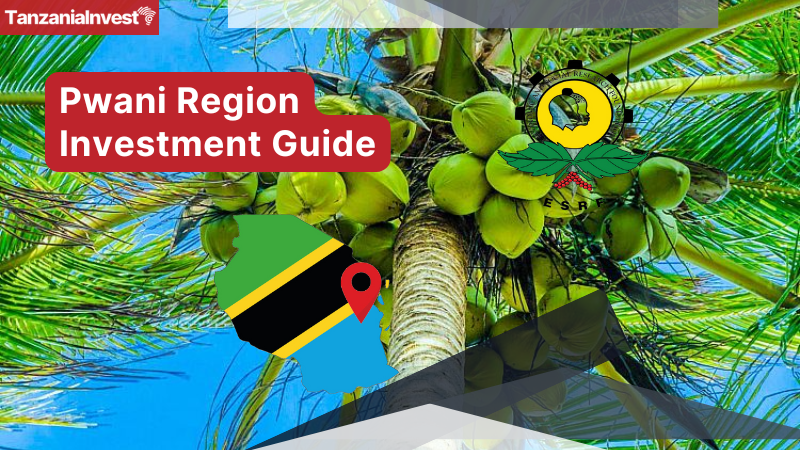The Economic and Social Research Foundation (ESRF) has developed a detailed Pwani Region Investment Guide, outlining key opportunities for local and foreign investors.
As part of a strategic partnership, TanzaniaInvest is republishing this guide to ensure a wider reach among potential investors.
Located along Tanzania’s eastern coast and bordering Dar es Salaam, the Pwani Region presents lucrative investment opportunities across various sectors, including agriculture, industry, tourism, fisheries, and infrastructure.
The region benefits from its strategic access to the Dar es Salaam Port, the Standard Gauge Railway (SGR), and major road networks that connect it to regional and international markets.
Reasons for Investing in Pwani Region
Strategic Position and Growing Economy
Pwani Region is a gateway to East and Southern Africa, with access to international trade routes via the Dar es Salaam Port, SGR, and major highways. Its proximity to Dar es Salaam makes it a prime destination for trade, logistics, and industrial investments.
Investment Climate
Tanzania’s pro-business policies, streamlined investment procedures, and Special Economic Zones (SEZs) and Export Processing Zones (EPZs) make Pwani a favorable location for investors. Investors benefit from tax incentives, land access support, and protections under the Tanzania Investment Act.
Infrastructure and Services
Pwani Region boasts modern transport infrastructure, including the SGR, Dar es Salaam Port, an extensive road network, and reliable telecommunications services. The region is also home to financial institutions, energy resources, and key industrial hubs.
Socio-Economic Profile of Pwani Region
Geographic and Demographic Overview
Pwani Region covers a land area of 3.35 million hectares, with a population of approximately 1.26 million (2018 estimate). The region’s coastal and inland agroecological zones support diverse economic activities, including agriculture, livestock, and tourism.
Key Economic Activities
Pwani’s economy is agriculture-driven, employing 80% of the population. The region is also a growing industrial hub, benefiting from pits roximity to Dar es Salaam’s commercial activities. Other key economic sectors include fisheries, tourism, and mining.
Agro-Ecological Zones
The region consists of three main agro-ecological zones:
- Coastal Belt Zone: Ideal for coconut, cassava, and horticultural crops.
- River Basin and Lowlands Zone: Fertile land for sugarcane, paddy, and vegetable farming.
- Highland Plateau Zone: Suitable for pulses, vegetables, and livestock farming.
Priority Investment Opportunities in the Pwani Region
Processing and Manufacturing
- Establishment of industrial parks at Kwala, Ruvu, and Soga
- Meat and leather processing industries
- Cement production and organic manure plants
Agriculture and Agro-Processing
- Cassava, coconut, and fruit farming and processing
- Dairy farming and milk processing plants
- Irrigation farming for horticulture, sugarcane, and paddy
Tourism and Hospitality
- Development of hotels, resorts, and marine tourism services
- Investment in Bagamoyo’s cultural heritage sites
- Ecotourism and game reserves in Saadani and Selous Game Reserve
Infrastructure and Real Estate
- Construction of modern markets and shopping malls
- Development of real estate and affordable housing projects
- Upgrading transport infrastructure and logistics hubs
Energy and Environment
- Investment in renewable energy projects
- Expansion of water supply and waste management solutions
Facilitation, Processes, Requirements, and Incentives
Supportive Policies and Incentives
The Tanzanian government provides tax exemptions, investment guarantees, and regulatory support for strategic projects, particularly in SEZs and EPZs.
Investment Processes
The Tanzania Investment Centre (TIC) and Pwani Regional Investment Office streamline the investment registration and facilitation processes. Land acquisition, business registration, and financial access are supported by local councils and banking institutions.
Access to Resources
Land for investment is readily available through regional authorities, while financial institutions provide business loans and support services. Investors also benefit from a skilled labor force and technical training programs.
Key Contacts in the Pwani Region
Pwani Regional Investment Office
- Website: https://pwani.go.tz/
- Regional Commissioner’s Office
- Address: Kibaha, Pwani Region, Tanzania
- Telephone: +255 22 2195000
- Email: ras@pwani.go.tz
Local Government Contacts
- Bagamoyo District Council
- Email: ded@bagamoyodc.go.tz
- Phone: +255 22 244 0042
- Kibaha Town Council
- Email: ded@kibahatc.go.tz
- Phone: +255 22 244 0371
- Mkuranga District Council
- Email: ded@mkurangadc.go.tz
- Phone: +255 22 244 0167
- Rufiji District Council
- Email: ded@rufijidc.go.tz
- Phone: +255 22 244 0189
Disclaimer
This guide provides essential information for potential investors in Pwani Region. It does not constitute legal or financial advice, and investors are encouraged to conduct independent feasibility studies. The information has been sourced from regional and local government officials, private sector stakeholders, and the ESRF.
Accessing the Full Guide
Download the Pwani Region Investment Guide PDF for complete details on investment opportunities and facilitation processes.










